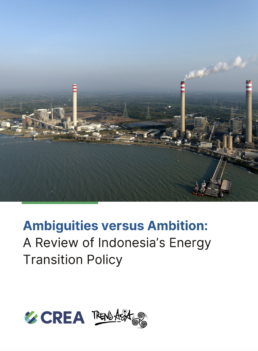This 2023 will be a crucial year, as the Indonesian Government is expected to release an Investment Plan for the JETP. Meeting targets set by the JETP, such as peak power sector emissions by 2030 and 34% renewable energy generation by 2030, will require an overhaul in power regulation and a divergence from past energy security planning. At present, Indonesia derives half of its electricity from coal-fired power plants CPP. In the last five years alone, over 12 gigawatts GW of fossil fuel capacity have been commissioned, increasing the country’s operating coal fleet by 30%. Meanwhile, non-fossil fuel development lags far behind; only 1.6 GW of renewable energy RE capacity was added between 2017 to 2021, mostly from hydro and geothermal. Solar and wind account for less than 1% of capacity additions.
The overwhelming additions of capital-intensive fossil fuels have contributed to the poor financial returns and heavy debt burdens on the state electricity company, Perusahaan Listrik Negara PLN. Oversupply is a major issue that developed as a combination of overestimating future demand, over constructing large fossil fuel-fired generators, and market barriers that prevent full utilization of this existing capacity. This will have to change under the JETP; new coal power plants, both committed and awarded should be halted and cancelled. PLN’s highly-anticipated update of the Electricity Supply Business Plan RUPTL will need to align with the targets under the partnership.
A closer look at key power sector policies and announcements reveal that exemptions and existing, planned projects may not be setting Indonesia in the most straightforward path to achieving an effective, efficient and timely energy transition.
This report looks at the state of capacity on Indonesia’s grid and the proposed capacity additions that could either prolong the use of fossil fuels or potentially deviate essential resources towards “new” and unproven technologies rather than renewable energy under the JETP. Both should be considered and addressed in PLN’s updated RUPTL.
Photo by Melvinas Priananda/Trend Asia


